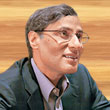put a positive spin
2016/03/15 08:41:21 網誌分類: 生活
Financial Secretary John Tsang Chun-wah put a positive spin on the meaning of the words a few months ago. To “put a positive spin” on something means to describe a situation in a way that makes it seem better than what people believe. For example, Holden Chow Ho-ding put a positive spin on losing to Alvin Yeung Ngok-kiu in the recent by-election by saying he didn’t lose by much. Tsang Chun-wah said localism means a love of local customs and values and pride in belonging to local society. The young people who are against mainland tourists coming here and who threw bricks at the police and started fires in Mong Kok on Lunar New Year’s Day say they are localists. Some want independence from China.
Legislative Council president Tsang Yok-sing said the Hong Kong and central governments should not treat these localists as troublemakers. But Chief Executive Leung Chun-ying put a negative spin (opposite of positive spin) on the localists by calling them rioters. Dictionaries define localists in different ways. A person who prefers his own area, culture, and local goods is a localist (noun). Many Hong Kong people support these localist(adjective) values. But localism can also mean wanting political power to be in the hands of the local instead of the central government. Some people in Hong Kong’s localism movement want self-rule. It is up to you to decide whether you want to put a positive or negative spin on localism.
香港英語傳媒現在開始用一個它過往從未用過的字,就是“localist”。我的朋友告訴我,他們現在也不時在中文媒體裏也遇着「本土派」這個字眼。一、兩年前,我在英語媒體難得(hardly ever)一見“localist” 或“localism” 這些字眼,現在差不多(virtually)天天都遇見它。“Localist” 和“localism” 實際是甚麼意思?“Localism” 是個名詞,“localist” 則可以是名詞或形容詞,而a localist 就是相信本土主義(localism)的人。這些字詞有不同的意思,也可有不同的用法。
幾個月之前,財政司司長曾俊華以頗為正面的說法(put a positive spin)去評論這些字眼。To “put a positive spin”的意思是將某事形容得比眾人認知的為好。譬如,周浩鼎在最近的補選中輸給楊岳橋,卻美化了事件(put a positive spin),說自己並不是輸很多。曾俊華說,本土主義(localism)是對本地習俗與價值的熱愛,是對本地社會產生歸屬感的一分自豪。那些反對內地自由行、農曆新年在旺角向警察擲磚和縱火的年輕人,也自稱為本土派(localists)。有些則希望可獨立於中國。
立法會主席曾鈺成說,香港和中央政府不應將這些本土派人士(localists)視為搞事者。但特首梁振英則為他們貼上負面標籤(put a negative spin,就是positive spin 的相反),稱這些本土派人士(localists)為暴徒。字典就着localists 這個字也有不同定義。一個人偏好自己的區域、文化與本地貨的,是個localist (名詞)。許多香港人也支持這種本土主義的(localists,形容詞)價值。但localism也指希望由本地人而非中央政府執掌政權。也有一些推崇香港本土主義(localism)的人想要自治權。你想為本土主義(localism)貼上正面抑或負面的標籤(put a positive or negative spin),完全取決於你自己。
中譯:七刻
Michael Chugani 褚簡寧
回應 (0)
我要發表

